You Oughta Know: The Motivation Series
Monthly conversations with psychologists and researchers who specialize in the science of motivation. They share their work and insights within their respective fields of sports, parenting, work, education, mental health, medicine, etc. The series focuses on a popular theory in psychology, called Self-Determination Theory (SDT) and is a co-production from the Center for Self-Determination Theory (CSDT) and The Learning Development Accelerator (LDA).
Episodes

Thursday Apr 24, 2025
You Oughta Know Jacques Forest
Thursday Apr 24, 2025
Thursday Apr 24, 2025
In this episode, we are joined by Jacques Forest, an expert in applying SDT in the work environment. He is the co-author of THE ABC OF WORK MOTIVATION with Anja Van den Broeck, Hermina Van Coillie, and Marcus B. Muller. You can buy the book wherever books are sold. You can also find it here: https://www.aup.nl/en/book/9789048562732/the-abc-of-work-motivation. The book is also available in French.
LDA is hosting a free MEET-THE-AUTHOR event on June 25, 2025 with Jacques, Anja, Hermina, and Marcus. It is open to the public and will be recorded for those who cannot make it. Learn more and register here:
https://members.ldaccelerator.com/c/upcoming-free-programs/meet-the-authors-of-the-abcs-of-work-motivation-6565600f-9d96-4dde-b42f-7d57a1182315
We discuss rewards and pay implications, the ROI of using SDT to foster a well-being-focused culture, and several practical tips. We deviate to talk about how fairness regarding money plays a role in how we perceive money motivationally.
Jacques mentions Maarten Vansteenkiste and Bart Soenens from UGent and their work on how needs satisfaction is universal, but not uniform. An example of their work is here:
https://biblio.ugent.be/publication/01HTM618TXZ27FFZ8W3NY97KE7.
Jacques references our friend, Marylene Gagne, whom we interviewed in an early episode of this podcast.
Jacques references a meta-analysis co-authored by Anya Van den Broeck about well-being. That article can be found here:
Van den Broeck, A., Howard, J. L., Van Vaerenbergh, Y., Leroy, H., & Gagné, M. (2021). Beyond intrinsic and extrinsic motivation: A meta-analysis on self-determination theory’s multidimensional conceptualization of work motivation. Organizational Psychology Review, 11(3), 240-273. https://doi.org/10.1177/20413866211006173 (Original work published 2021)
Anya also co-authored an excellent and related article with Maarten Vansteenkiste and others. You can find that here:
Van den Broeck, Anja & Vansteenkiste, Maarten & De Witte, Hans & Lens, Willy. (2008). Explaining the relationships between job characteristics, burnout, and engagement: The role of basic psychological need satisfaction. Work & Stress. 22. 277-294. 10.1080/02678370802393672.
Jacques is an Organizational Psychologist and Certified Human Resources Professional (CHRP, Distinction Fellow) Full professor in the Department of Organization and Human Resources at UQAM Business School, Jacques Forest is a master in the art of building bridges between science and practice. His research focuses on self-determination theory (SDT) and the motivational factors needed to reconcile performance and well-being in a sustainable way.
You can find Jacques at UQAM (https://professeurs.uqam.ca/professeur/forest.jacques/) or linkedin: (https://www.linkedin.com/in/jacquesforest/)
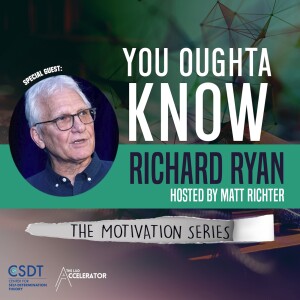
Monday Jan 06, 2025
You Oughta Know Richard M. Ryan On Health and Fitness
Monday Jan 06, 2025
Monday Jan 06, 2025
Throughout the year, SDT's Richard Ryan joins us for a short, targeted conversation about a specific topic within the realm of SDT.
In this episode, Rich explores the topic of healthcare. He explains some of the nuance associated with why we may or may not take care of ourselves (we know exercise is good for us, but don't do it), or why doctors and healthcare providers don't always succeed in supporting their patients adhering to given advice. He suggests we advocate for ourselves by developing better relationships with our providers. He also urges those same providers to take more time listening and connecting with us.
Rich Ryan is a professor at the Institute for Positive Psychology and Education at the Australian Catholic University and a research professor at the University of Rochester. He lectures frequently in the United States and abroad on Self-Determination Theory and the factors that promote motivation and healthy psychological and behavioral functioning. He is also a co-founder of Immersyve, Inc., a motivational consulting company in Orlando, FL.

Wednesday Jan 01, 2025
You Oughta Know Martin Lynch
Wednesday Jan 01, 2025
Wednesday Jan 01, 2025
In this episode, Matt chats with Martin Lynch about the motivational effects motivation— specifically SDT— has on culture. We explore how different cultures may experience the satisfaction of the basic psychological needs from the theory. How do different cultural perspectives represent a concept like autonomy? Are cultures possibly undermining in of themselves? How can they be supportive of needs? How are universal needs like autonomy, competence, and relatedness understood, experienced, and represented in oppressive and authoritarian cultures?
Martin shares his own research work in cross-cultural motivation on these topics and more.
Matt mentions the life of Dmitri Shostakovich. The two references he mentions are Testimony: The Memoirs of Dmitri Shostakovich and Elizabeth Wilson’s Shostakovich: A Life Remembered.
We take a brief detour to discuss some of the limitations associated with self-scoring assessments and surveys used in research; and how those researchers in SDT mitigate some of those effects using processes like observational research and meta-analysis. Combining self-scoring and observational techniques, Martin talks a bit about experience sampling. You can learn more about it here: https://academy.pubs.asha.org/2014/11/experience-sampling-method/
Matt references the conversation he had in a previous YOU OUGHTA KNOW episode with psychologist, Maarten Vansteenkiste. You can find it here: https://ldaccelerator.com/sdtpodcast.
Martin mentions the concept of Filial piety. You can learn more about it here: https://en.wikipedia.org/wiki/Filial_piety#:~:text=of%20one's%20parents.-,Filial%20piety%20means%20to%20be%20good%20to%20one's%20parents;%20to,the%20affection%20of%20its%20parents/
Matt was talking about Barbara Ilardi. You can learn more about her and her work here: https://www.researchgate.net/profile/Barbara-Ilardi. We couldn’t find any specific work from her about Feedback… so Matt’s memory was faulty. However, Barbara’s work is nonetheless super and worth a dig into.
A sampling of some of the references Martin alludes to are:
Chirkov, V., Ryan, R. M., Kim, Y., & Kaplan, U. (2003). Differentiating autonomy from individualism and independence: A self-determination theory perspective on internalization of cultural orientations and well-being. Journal of Personality and Social Psychology, 84(1), 97–110. https://doi.org/10.1037/0022-3514.84.1.97
Deci, E. L., Ryan, R. M., Gagné, M., Leone, D. R., Usunov, J., & Kornazheva, B. P. (2001). Need satisfaction, motivation, and well-being in the work organizations of a former Eastern bloc country: A cross-cultural study of self-determination. Personality and Social Psychology Bulletin, 27(8), 930–942. https://doi.org/10.1177/0146167201278002
Lynch, M. F., La Guardia, J. G., & Ryan, R. M. (2009). On being yourself in different cultures: Ideal and actual self-concept, autonomy support, and well-being in China, Russia, and the United States. The Journal of Positive Psychology, 4, 290-304.
Nalipay, M.J.N., King, R.B. and Cai, Y. (2020), Autonomy is equally important across East and West: Testing the cross-cultural universality of self-determination theory. Journal of Adolescence, 78: 67-72. https://doi.org/10.1016/j.adolescence.2019.12.009
Sheldon, K. M., Elliot, A. J., Ryan, R. M., Chirkov, V., Kim, Y., Wu, C., et al. (2004). Self-concordance and subjective well-being in four cultures. Journal of Cross-Cultural Psychology, 35, 209–223.
MORE ABOUT MARTIN:
Martin Lynch, a clinical psychologist, joined the Warner School faculty at the University of Rochester in 2008, teaching in the counseling and counselor education and human development programs. His research focuses on the effects of social context on human motivation, personality development, and well-being, with an emphasis on Self-Determination Theory. His current research interests include cross-cultural issues in the role of autonomy support; the sources of within-person variability in trait self-concept, well-being, and life satisfaction; motivation for emigration; and adjustment of international students. He is also involved in applied motivational research in the domains of education and counseling and psychotherapy. Additionally, Martin is a nationally certified counselor (NCC) and a licensed clinical psychologist in New York State.
You can find Martin here:
https://www.warner.rochester.edu/directory/martin-lynch
https://www.linkedin.com/in/martin-lynch-7b244639/
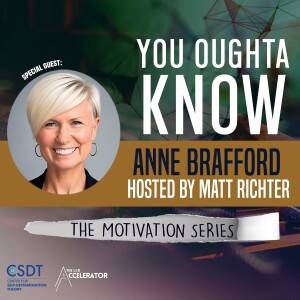
Friday Nov 08, 2024
You Oughta Know Anne Brafford
Friday Nov 08, 2024
Friday Nov 08, 2024
In this episode, I have the opportunity to talk with Dr. Anne Brafford who is an expert in DEI (Diversity, Equity, and Inclusion). Of course, we take the self-determination theory lens as the filter for our discussion. We take the time to define our terms… exactly what is diversity, equity, and inclusion. Check out Anne’s orchestra metaphor for DEI!
We get into a deep conversation about identity and specifically, cultural identity… like what it means to be a lawyer, a mother, or something else. We explore how one’s self identity affects well-being and other parts of who I am. Anne shares the model she developed in her doctoral thesis: Identify Harmony Model of Inclusion, where she introduces the concept of multiple identities.
We also delve into the nuances about practical applications and how SDT provides an effective filter for these applications. And so much more!
ABOUT ANNE
Dr. Anne Brafford, JD, MAPP, PhD, is the owner of Aspire, an education and consulting firm for the legal profession. Previously a partner at Morgan Lewis, Anne now focuses on individual and workplace thriving, especially the intersection of inclusion, engagement, and well-being. Her aim is to help the legal profession build engaging workplaces where people and businesses can grow and succeed together. Her book, Positive Professionals, provides science-based guidance for increasing engagement in law firms. Anne has earned a PhD in positive organizational psychology and a Masters of Applied Positive Psychology (MAPP). She is a co-founder of the Institute for Well-Being in Law and its Chief Strategy Advisor. Anne can be reached at abrafford@aspire.legal.
REFERENCES:
Brafford, A. M. (2018). Engaging and retaining women lawyers: Examining the role of high-quality leader-member exchange and gender differences in need-satisfaction [Unpublished master’s thesis]. Claremont Graduate University. Downloaded from ResearchGate.net. https://doi.org/kzj8
Brafford, A. M. (2019). How male-dominated work cultures curtail women’s leadership aspirations: A review based on the expectancy-value model of motivation. [Unpublished manuscript]. Downloaded from ResearchGate.net.
Brafford, A. M. (2023). Identity harmony: An identity- and self-determination theory-based conceptualization of the experience of workplace inclusion (Doctoral dissertation, Claremont Graduate University).
Jansen, W. S., Otten, S., van der Zee, K. I., & Jans, L. (2014). Inclusion: Conceptualization and measurement. European Journal of Social Psychology, 44(4), 370–385. https://doi.org/gfb549
Shore, L. M., Randel, A. E., Chung, B. G., Dean, M. A., Holcombe Ehrhart, K., & Singh, G.(2011). Inclusion and diversity in work groups: A review and model for future research. Journal of Management, 37(4), 1262–1289. https://doi.org/bbwtv4

Friday Sep 27, 2024
You Oughta Know Maarten Vansteenkiste
Friday Sep 27, 2024
Friday Sep 27, 2024
Today’s guest is Dr. Maarten Vansteenkiste, professor in the development and motivation psychology at Ghent University.
We discuss the concept of needs crafting and agency. Maarten shares what is meant by these ideas (the act of one affecting one’s own environment directly… to steer one’s own life’s circumstances). He distinguishes between being autonomous and being independent.
We also discuss the CIRCUMPLEX, or COMPASS, a unique way to conceptualize how needs get supported or undermined.
We take a late detour to talk about how SDT can actually support techniques like explicit/ direct instruction.
REFERRALS
During the episode, we reference many other researchers.
Maarten mentions the work of Johnmarshall Reeve and the concept of agentic engagement. A good reference for this is the article Reeve wrote with Stephanie Shin called How Teachers Can Support Students’ Agentic Engagement. (Reference: Reeve, J., & Shin, S. H. (2020). How teachers can support students’ agentic engagement. Theory Into Practice, 59(2), 150–161. https://doi.org/10.1080/00405841.2019.1702451).
Maarten references the LifeCraft Program. You can learn more about it here (the write-up is in Dutch). https://motivationbarometer.com/en/lifecraft/
He also alludes to Albert Bandura, and his work on agency.
Along with the aforementioned work by Johnmarshall Reeve, he also refers to Erika Patall and her research… highlighted here, among other places: Patall, Erika. (2024). Agentic Engagement: Transcending Passive Motivation. Motivation Science. 10. 10.1037/mot0000332.
MORE ABOUT MAARTEN:
Maarten Vansteenkiste is, since 2014, a full professor in the Department of Developmental, Personality, and Social Psychology at Ghent University. Since his research internship at the University of Rochester, collaborating with Prof. Dr. Ryan and Prof. Deci, the founding fathers of Self-Determination Theory (SDT), he has substantially contributed to the extension, refinement, application and dissemination of this framework, both in collaboration with these founding fathers (Vansteenkiste & Ryan, 2013; Vansteenkiste, Ryan, & Soenens, 2020), but also largely independently from them, thereby establishing his own line of scientific work. His work addresses novel topics in the motivational literature, such as the study of motivational profiles, individuals' multiple reasons for lacking motivation, the notion of need crafting, the interface between psychological and physiological needs, and the development of a more fine-grained and holistic understanding of how different (de)motivating practices of socializing agents (e.g., teachers, parents) relate to each other. Further, his work is not limited to the development of SDT as such but extends to the motivation literature more broadly as he has written theoretical reviews and book chapters that plea for a cross-fertilization between SDT and motivational interviewing, achievement goal theory, and expectancy-value theory.
In terms of its societal impact, his work has had a strong influence on the domains of education, sports, and parenting. Particularly impactful was the publication of a Dutch handbook entitled ‘Vitamins for growth’ (Vansteenkiste & Soenens, 2015), followed by the publication of a practice-friendly book ‘Motivating coaching in the sport’ (Aelterman et al., 2017). He played a critical role during the COVID-19 crisis as a member of the key scientific advisory committee (GEMS) to aid policy makers in developing an evidence-based policy. To this end, he led a consortium of scholars who tracked diverse aspects of individuals’ psychological functioning (motivation, well-being, vaccination) across 2,5 years during the pandemic. The Motivation Barometer Project (www.motivationbarometer.com) provided an unique insight in the psychological impact of the crisis and received substantial attention in the media, with more than 40 reports being published on a regular basis.

Thursday Aug 29, 2024
You Oughta Know Richard M. Ryan On Business
Thursday Aug 29, 2024
Thursday Aug 29, 2024
Each month, SDT's Richard Ryan joins us for a short, targeted conversation about a specific topic within the realm of SDT. In this episode, Rich talks about the application of SDT to the context of business.
Rich starts with the impact of pay-for-performance… especially in the realm of sales environments. Controlling pay-for-performance systems undermine intrinsic motivation. He talks about how incentive systems may affect the spirit- the morale- of the employee. One needs to consider the motivational aspects and consequences when designing reward systems. Ultimately, sales environments should take into account more than just the numbers. Relationships and other factors should matter as much, if not more.
We navigate to other areas of work and explore how one can create meaning and value for all levels of jobs. Everyone has an important task and contribution to the organization. That principle needs to be lived and communicated.
Finally, we end with Rich sharing some tactics managers should employ to support the psychological needs of team members. Rich shares one resource managers can leverage to become more effective from his own consulting company, Immersive, found here: https://immersyve.com.
Ultimately every worker needs to feel valued and important.
Next month, we discuss SDT in the context of healthcare.
Rich Ryan is a professor at the Institute for Positive Psychology and Education at the Australian Catholic University and a research professor at the University of Rochester. He lectures frequently in the United States and abroad on Self-Determination Theory and the factors that promote motivation and healthy psychological and behavioral functioning. He is also a co-founder of Immersyve, Inc., a motivational consulting company in Orlando, FL.
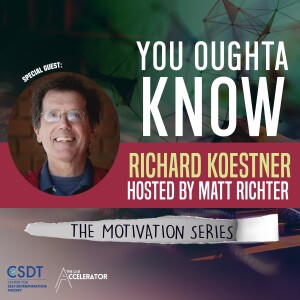
Monday Aug 05, 2024
You Oughta Know Richard Koestner
Monday Aug 05, 2024
Monday Aug 05, 2024
In this episode of You Oughta Know: The Motivation Series, Matt is joined by Richard Koestner, professor of psychology from McGill University.
Today, we talk all things goals. Goal setting, goal achievement, tactics for successful goal attainment, how goals can get undermined, and more.
SHOW NOTES:
Richard mentions the work of Ken Sheldon, Andy Eliot, and Tim Kasser and their respective studies from the 90s and early 2000s.
Sheldon, K. M., & Elliot, A. J. (1998). Not all personal goals are “personal”: Comparing autonomous and controlling goals on effort and attainment. Personality and Social Psychology Bulletin, 24, 546- 557.
Sheldon, K. M., & Elliot, A. J. (1999). Goal striving, need satisfaction, and longitudinal well-being: The self-concordance model. Journal of Personality and Social Psychology, 76, 546-557.
Sheldon, K. M., & Elliot, A. J. (2000). Personal goals in social roles: Divergences and convergences across roles and levels of analysis. Journal of Personality, 68, 51-84.
Sheldon, K. M., & Kasser, T. (1998). Pursuing personal goals: Skills enable progress but not all progress is beneficial. Personality and Social Psychology Bulletin, 24, 1319-1331.
He mentions Ed Deci’s popular book, WHY WE DO WHAT WE DO.
He also mentions goal and self-regulation failure from the work of Roy Baumeister, and others.
Matt references Cognitive Load Theory by John Sweller.
Richard mentions Bob Vallerand’s work on Harmonious Passion versus Obsessive Passion. Vallerand, R.J. The role of passion in sustainable psychological well-being. Psych Well-Being 2, 1 (2012). https://doi.org/10.1186/2211-1522-2-1.
Richard talks about the Big Five Personality Traits. https://en.wikipedia.org/wiki/Big_Five_personality_traits.
MORE ABOUT RICHARD:
Richard is a professor of Psychology at McGill University where he has conducted research on personality and human motivation for over 30 years. Richard did his PhD research at the University of Rochester with Edward Deci and Richard Ryan and subsequently completed a post-doctoral fellowship at Harvard University with David McClelland. Richard has published over 250 scientific articles, and his recent work focuses on how to effectively set and pursue personal goals.
You can learn more about, or contact Richard here: https://www.mcgill.ca/psychology/richard-koestner

Tuesday Jul 16, 2024
You Oughta Know Richard M. Ryan- SDT On Education (Audio only)
Tuesday Jul 16, 2024
Tuesday Jul 16, 2024
(THE AUDIO-ONLY VERSION)
Each month, SDT's Richard Ryan joins us for a short, targeted conversation about a specific topic within the realm of SDT. For this inaugural chat, Rich talks about the application of SDT to the context of education.
Rich explores what really engages learners when learning. He highlights how supporting the needs for competence and autonomy are essential to engagement and how testing environments can undermine both.
He answers the question how rewards and punishments are specifically undermining. Rich also shares some strategies for classroom management to enhance the interest and engagement of students.
While want to provide feedback, inherent to the intention of learner assessment, high-stakes testing has the opposite effect. Feedback is indeed essential, but high-stakes tests are gate-keeping instruments that do not help the motivational impact on students and don't provide that informational feedback. Ongoing assessment and feedback are, again, essential!
Rich shares the effects of constant grading and how grading can have a detrimental effect on how motivated students are to learn. Again, he highlights that there is a difference between grading and providing necessary feedback for learning.
We end our discussion talking about the policies we should put in place that support student development.
Next month, we discuss the SDT in the context of business.
Rich Ryan is a professor at the Institute for Positive Psychology and Education at the Australian Catholic University and a research professor at the University of Rochester. He lectures frequently in the United States and abroad on Self-Determination Theory and the factors that promote motivation and healthy psychological and behavioral functioning. He is also a co-founder of Immersyve, Inc., a motivational consulting company in Orlando, FL.

Monday Jun 17, 2024
You Oughta Know Lennia Matos
Monday Jun 17, 2024
Monday Jun 17, 2024
In this episode, Matt is joined by Lennia Matos. Lennia is a professor at Pontificia Universidad Católica del Perú. She is also an SDT international scholar and Editorial Member for the CSDT.
Together, they explore the mechanics and techniques one can use to enhance teaching in educational settings. They discuss how satisfying the three basic needs enhances the motivational experience and how positive motivation supports learning overall.
We discuss the relationship dynamics between teacher and student.
Matt references Nathalie Aelterman from Impetus Academy. You can find more about Impetus here: https://www.impetus.academy.
Lennia mentions Johnmarshall Reeve, one of her co-authors on their book, SUPPORTING STUDENTS’ MOTIVATION: STRATEGIES FOR SUCCESS. The other co-authors are: Richard Ryan, Sung Hyeon Cheon, and Haya Kaplan.
Matt references his partner, Thiagi, who focuses on designing activities that achieve different instructional objectives engagingly.
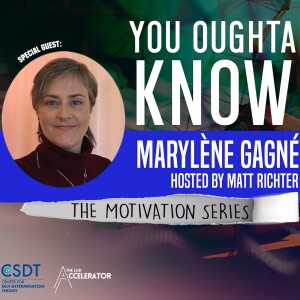
Friday May 24, 2024
You Oughta Know Marylène Gagné
Friday May 24, 2024
Friday May 24, 2024
Welcome to You Oughta Know: The Motivation Series. Today’s guest is Marylène Gagné. Marylène is a Professor at the Future of Work Institute in the Faculty of Business and Law at Curtin University in Perth, Australia. The Institute promotes productive and meaningful work as essential foundations of a healthy economy and society. Marylène's research examines how organizations, through their structures, cultures, rewards, tasks, and management, affect people’s motivational orientations towards their work.
(Note, at different times during the discussion, Marylène’s office lights went out and that is what we refer to when we say, “whoops…”)
Our discussion today will focus on various types of work environments- specifically in how pay and other compensation and benefit models affect motivation, productivity, and performance. Of course, we talk about many other related topics in the context of work, as well.
SHOW NOTES:
Marylène refers to Edward Deci, one of the co-founders (along with Richard Ryan), of Self-Determination Theory (SDT). Ed and Rich spent a bulk of their careers at the University of Rochester.
During the conversation, Marylène provides a quick overview of SDT. She explains the different types of motivation one might experience according to the theory.
We discuss how organizations can reconcile the business agendas for profit and control with what SDT offers. We explore management control systems and how they can undermine the basic psychological needs. We also explore various methods leaders and managers can use to better align to needs satisfaction and ultimately, better levels of well being. We talk about how can we set a good, needs supportive culture.
We chat about the long-term benefits SDT alignment can have.
Marylène shared an historical perspective on management styles and how they have morphed as organizational structures and strategic objectives have shifted.
Marylène also discusses agency theory, and how it is in direct opposition to SDT. She provides a bit of history of that theory and the implications of its promotion— especially as it continues to get promoted in business schools.
We go deeper on the comp structures of sales organizations and whether it is even possible for sales professionals to identify and integrate the value of their work while striving to meet quotas and their other numbers.
Ultimately, we discuss the need for employees to reach that level of identification and integration of why they do what they do. In other words, supporting ways for employees to care about their work authentically.
One can summarize our discussion about how organizations should ultimately “do no harm” to their employees. That they should support the authentic, substantiative, and interesting work people can do. Organizations should have good work design in place and they should avoid doing silly, pointless efforts that employees perceive as banal, like yoga classes or stress management— rather… fix the work environment.
We talk a bit about leadership, specifically leadership development. Matt references the work of Jeffrey Pfeffer. The popular text he wrote on the topic is called Leadership BS. And he mentions Barbara Kellerman, from Harvard, who has written several popular books on the subject, Specific to Leadership Development issues is her book, Professionalizing Leadership. Both Pfeffer and Kellerman also have several academic papers supporting their work, as well. Shameless plug, Matt summarized the issues associated with Leadership Development here. https://bit.ly/3QwRPLI. It is a free download.
We talk about the impact the pandemic has had on well being. What we thought would happen, and what did happen. Marylène references Nick Bloom from Stanford, and his research on hybrid work. He wrote a paper with Ruobing Han and James Liang on how it is working out. You can find that paper here: https://www.nber.org/papers/w30292
Some of Marylène’s current research work is on the motivational effects on the workers in the gig economy. We spend some time discusses her recent work in this area. The topic of Nudging rears its head again.
The best place to find Marylène is on LinkedIn. https://www.linkedin.com/in/marylène-gagné-411532/
Marylène has written extensively on the applications and research of SDT in the context of work. A recent and favorite recommendation of ours was published in 2022 in Nature Reviews Psychology. She and her co-authors wrote a wonderful piece called, Understanding and shaping the future of work with self-determination theory.
You can find it, the other co-authors, and the formal citation here: https://www.nature.com/articles/s44159-022-00056-w#citeas
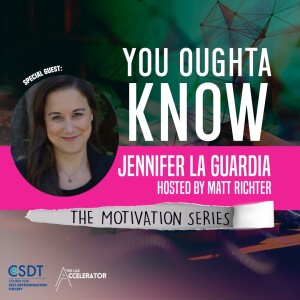
Wednesday May 15, 2024
You Oughta Know Jennifer La Guardia
Wednesday May 15, 2024
Wednesday May 15, 2024
In this episode, we focus on mental health and behavior change. Our guest is the wonderful Jennifer La Guardia, a behavioral scientist and clinical psychologist from an organization called Brightline.
We talk about Digital Health in the mental health space. Specifically in the context of child and family care. What it is, how it works, and more. For example, many don’t have access to the care they need, whether that is due to time, money, distance, or even the stigma sometimes- unfortunately- associated with mental health.
We allude to nudge and some of the research issues associated with that behavioral modification approach. Matt references the validity and reliability issues/ scandals around the theory. Jennifer discusses the SDT issues with it— how it can be paternalistic and undermining. We do discuss how certain aspects of nudge can potentially be supportive of the psychological needs, but often, in how it is utilized, it can be leveraged punitively.
Independently of SDT, here is an article discussing the ethical issues of nudge: https://journals.sagepub.com/doi/epub/10.1177/10434631231155005
NPR did a great podcast episode on the publication scandal associated with nudge. https://www.npr.org/transcripts/1190568472
We briefly explore the ties between emotional regulation and motivation and the “why’s” for “eating the cookie” or getting that other reward. The key is to get people to make thoughtful, more controlled, and autonomous decisions regarding their health.
We discuss competition, specifically things like having “accountability buddies” when losing weight or other “motivating” health goals. When one doesn’t win, or one is losing, this feeling also can undermine. Rather, having shared, collaborative goals is more effective over the long run.
Matt references Edward Deci, one of the founding thought leaders of SDT. Competition can be great, if the focus is on the activity itself and the win/lose aspect of the competition is a natural outcome of that activity.
We talk about introjection, a concept in SDT where the catalyst for motivation is based in ego, obligation, or other internalized controlling factors. We use introjection as a basis to discuss why people struggle with weight loss, or body image, or even just feeling bad if one doesn’t live up to standards from those around them.
We discuss how parents can support their children more effectively in lifestyle and health development. There is a mental health crisis, made worse since COVID began. We tend to wait for the problem to happen, rather than early prevention.
This is where coaching comes into play. Jennifer defines and explains how coaching fits into the greater process of care. She talks about how difficult behavior change is… how stressful it can be.
Finally, if you are looking for a behavior modification program, Jennifer shares some pointers.
More about Jennifer.
Jennifer has 20+ years experience promoting motivational approaches to health behavior change, management of chronic illness (e.g., overweight/obesity, diabetes, cardiovascular disease), and improving personal well-being. She is an expert in SDT, and has designed, implemented, and evaluated large scale health behavior interventions (‘live’, web-based, mobile health). Her work brings practical solutions for implementing best healthcare practices within employee and community populations. She earned her Ph.D. at the University of Rochester under the supervision of Dr. Richard Ryan, one of the creators of SDT. She has worked as a consultant with workplace and community organizations, the National Cancer Institute, and international groups. Currently, she is the VP Care Innovation for Brightline.
And her organization, Brightline, can be found here: https://www.hellobrightline.com
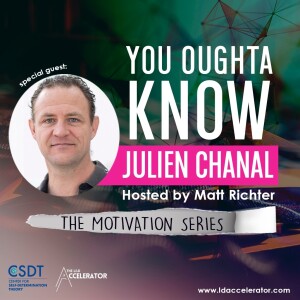
Friday Apr 26, 2024
You Oughta Know Julien Chanal
Friday Apr 26, 2024
Friday Apr 26, 2024
Our first guest is Julien Chanal from the University of Geneva.
During the episode, Matt and Julien discuss fitness and physical activity, which are specialties of Julien's work and research. Specifically, we talk about how kids's motivation to be active works and how childhood activity is an excellent predictor for how active adults are (and their respective motivation). We explore the strategies schools and parents can take to support fitness activity.
We also dig into another area of interest for Julien... Burnout, within the context of work. We also try and define well being within the context of SDT. We differentiate happiness from well being, as well.
Of course, we are referring to Richard Ryan and Edward Deci, the originators of the theory. And since this is a show about Self-Determination Theory, that is the foundational model we use to inform our conversation. You can learn more about Rich and Ed, as well as the theory, at the Center for Self-Determination Theory.
You can learn more about the SDT Geneva Center here:https://www.researchgate.net/lab/SDT-Geneva-Center-Julien-Chanal
During the show, Julien references his colleague: Sandrine Isoard-Gautheur. You can learn more about her work at:
https://laboratoire-sens.univ-grenoble-alpes.fr/sandrine-isoard-gautheur
https://www.researchgate.net/profile/Sandrine-Isoard-Gautheur
More about Julien...
Julien Chanal is a distinguished professor at the Université de Genève, specializing in psychology and education sciences. He is renowned for his leadership as the chair of the SDT Geneva Center and his significant contributions to the field of self-determination theory research. With expertise in optimizing motivation and engagement across various domains, Julien Chanal is committed to advancing psychological well-being and educational practices worldwide.
You can find Julien here:https://www.unige.ch/fapse/mad/equipe/chanal
Or, on LinkedIn: https://www.linkedin.com/in/julien-c-3a05ab27/
We also refer to psychologist, Jacques Forest, and his recent book, Libérer la motivation with Anja Van den Broeck, Hermina Van Coillie, and Marcus B. Mueller. You can find the book here.
Julien references researcher, Luc Pelletier. You can learn more about him, here.

PROGRAM OVERVIEW
Monthly conversations with psychologists and researchers who specialize in the science of motivation. They share their work and insights within their respective fields of sports, parenting, work, education, mental health, medicine, etc. The series focuses on a popular theory in psychology, called Self-Determination Theory (SDT) and is a co-production from the Center for Self-Determination Theory (CSDT) and The Learning Development Accelerator (LDA).






